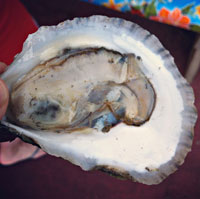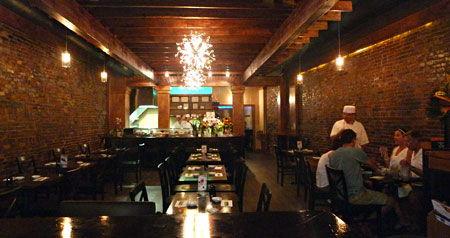 Sharon Kitchens from Delicious Musings with the help from the Maine Department of Tourism has arranged for a set of ‘from away’ bloggers to go for a week long culinary tour in Maine. The bloggers participating in the program are:
Sharon Kitchens from Delicious Musings with the help from the Maine Department of Tourism has arranged for a set of ‘from away’ bloggers to go for a week long culinary tour in Maine. The bloggers participating in the program are:
- Rebecca Crump from Nashville
who writes Ezra Pound Cake - Joy Wilson from Los Angeles
who writes Joy the Baker - Jennifer Yu from the a small town in the Colorado Rockies who writes Use Real Butter
I had the pleasure of joining them last night for a 12-course kick-off feast at El Rayo (see photos by Use Real Butter). The meal featured Nonesuch Oysters and goat from Ten Apple Farm. Karl Schatz and Margaret Hathaway, owners of Ten Apple Farm, and Abigail Carroll from Nonesuch were on-hand to join in the meal and provide background on their respective operations.
Today the bloggers are visiting GMRI, The Well, Jordan’s Farm, Broadturn Farm, and Maine Mead Works capped off by a dinner at Fore Street. Tomorrow morning after a fueling up with some baked good from Standard they will travel to the Midcoast and then out on a 3-day trip sailing trip.
It sounds like a really fun adventure and I look forward to reading all about it on each of their blogs in the near future.
Photo Credit: Sharon Kitchens

